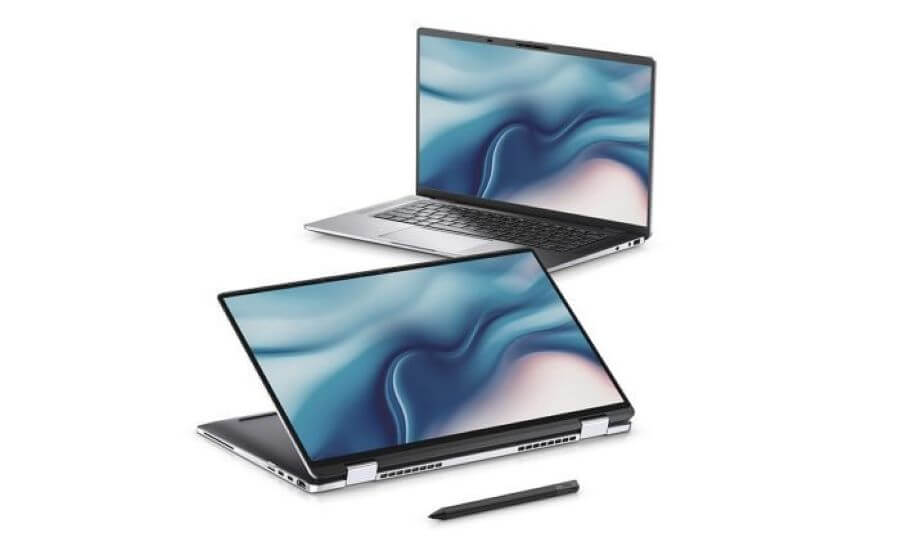
The News: This week at CES 2020 in Las Vegas, Dell introduced the Latitude 9000 series, designed with the finest details in mind to be smaller and thinner than ever before, with a larger display and a superior experience. The new Latitude 9510 delivers what business users seek: the longest battery life of any 15-inch business PC with a target of up to 30 hours2, 5G-ready design3, powerful audio features and intelligent solutions that increase productivity.
The Latitude 9510 is the world’s smallest and lightest commercial 15-inch PC4, easily fitting into a small work bag. Starting at only 3.2 pounds5, professionals can travel light without carrying the extra weight of battery chargers, adapters or speakerphone pucks needed for a work day. The large screen size, along with Intel® Wi-Fi 6 (Gig+) and 5G mobile broadband capabilities6, allow executives to be more productive wherever they need. The design incorporates 5G antennas into the speakers to retain the InfinityEdge display, while carbon blade fans and dual heat pipes offer a quiet and cool-to-the-touch experience. Launching with up to the latest 10th Gen Intel® Core™ i7 processors, the vPro ready Latitude 9510 features a machined-aluminum finish with diamond cut edges for professionals that want performance with style. Read the full news release from Dell.
Analyst Take: The lines between consumer and commercial are blurring quickly as many of the hot announcement at CES have equally as many enterprise applications as they do consumer. I guess that fits in the line of “Consumerization of Everything” that has driven so much of the tech evolution over the past 20 years.
For Dell, CES is always a big event because the company sells a lot of PCs to consumers for gaming, general use, home office, education etc. This has made CES a great platform for the company to roll out new models and 2020 was no different with a beautiful new XPS 13 and an interesting launch from Alienware that puts Dell squarely into the middle of the mobile gaming revolution. However, what caught my attention was the announcement of a new 15 inch, lightweight, power friendly Latitude that I think is going to have big implications in the commercial space; which given the Latitude is traditionally aimed commercial, shouldn’t be too surprising.
The Dell Latitude 9000 Series Should Win in Commercial.
We are seeing a lot of migration toward lighter weight laptops, from the Surface to the LG Gram to a variety of Lenovo, Samsung and HP models that also fit this bill. The challenge historically has been power to weight, whereas business travelers that wanted to bring a powerful machine that didn’t compromise often meant devices that were bulky, thick and heavy. However, in the world where our “Phone” is a relative super computer, most people want a much lighter, thinner yet no-compromise laptop to take their business on the road and that looks to be exactly what the new Latitude 9000 series can offer. I believe this will make the device very popular for commercial uses.
The model that really caught my eye was the Latitude 9510. I know 13″ models can be good enough, but having spent the past decade with a 15″ laptop and sometimes toting a 17″, I think surface area on the screen matters. At only 3-4 pounds, I think business travelers will love this. It is small enough that a person with a small case or purse can likely fit this without making the case too heavy to tote, but once powered up it will give a small workstation like performance.
The other thing that I really liked about this model was the inclusion of the i7, which is Intel’s very robust 10th Gen core processor. While I wouldn’t be surprised to see an AMD variant in the near future based upon its new launch, the i7 is a powerhouse in its own right and certainly can handle the job for commercial/business use with few exceptions. The device also is designed to support 5G and WiFi 6. I haven’t been able to verify yet if it is Project Athena certified, but I would be surprised if it isn’t. This should expand the product’s attractiveness for commercial as I’m bullish on the ACPC; especially as 5G proliferates.
Overall, I see the lines between consumer and commercial continuing to blur for most general use PC/Laptop configurations. Getting smaller in weight, but not sacrificing the screen will give business users the best of both worlds, which is why I liked what I saw with the new Dell Latitude 9510.
Futurum Research provides industry research and analysis. These columns are for educational purposes only and should not be considered in any way investment advice.
Read more analysis from Futurum Research:
Nokia Secures Its Security Messaging
Qualcomm and ZTE Light Up 5G with Demonstrable Voice over NR Capabilities
CES 2020: It Might As Well Stand for Connected Ecosystems Showcase
Image Credit: Dell
The original version of this article was first published on Futurum Research.
Daniel Newman is the Principal Analyst of Futurum Research and the CEO of Broadsuite Media Group. Living his life at the intersection of people and technology, Daniel works with the world’s largest technology brands exploring Digital Transformation and how it is influencing the enterprise. From Big Data to IoT to Cloud Computing, Newman makes the connections between business, people and tech that are required for companies to benefit most from their technology projects, which leads to his ideas regularly being cited in CIO.Com, CIO Review and hundreds of other sites across the world. A 5x Best Selling Author including his most recent “Building Dragons: Digital Transformation in the Experience Economy,” Daniel is also a Forbes, Entrepreneur and Huffington Post Contributor. MBA and Graduate Adjunct Professor, Daniel Newman is a Chicago Native and his speaking takes him around the world each year as he shares his vision of the role technology will play in our future.

